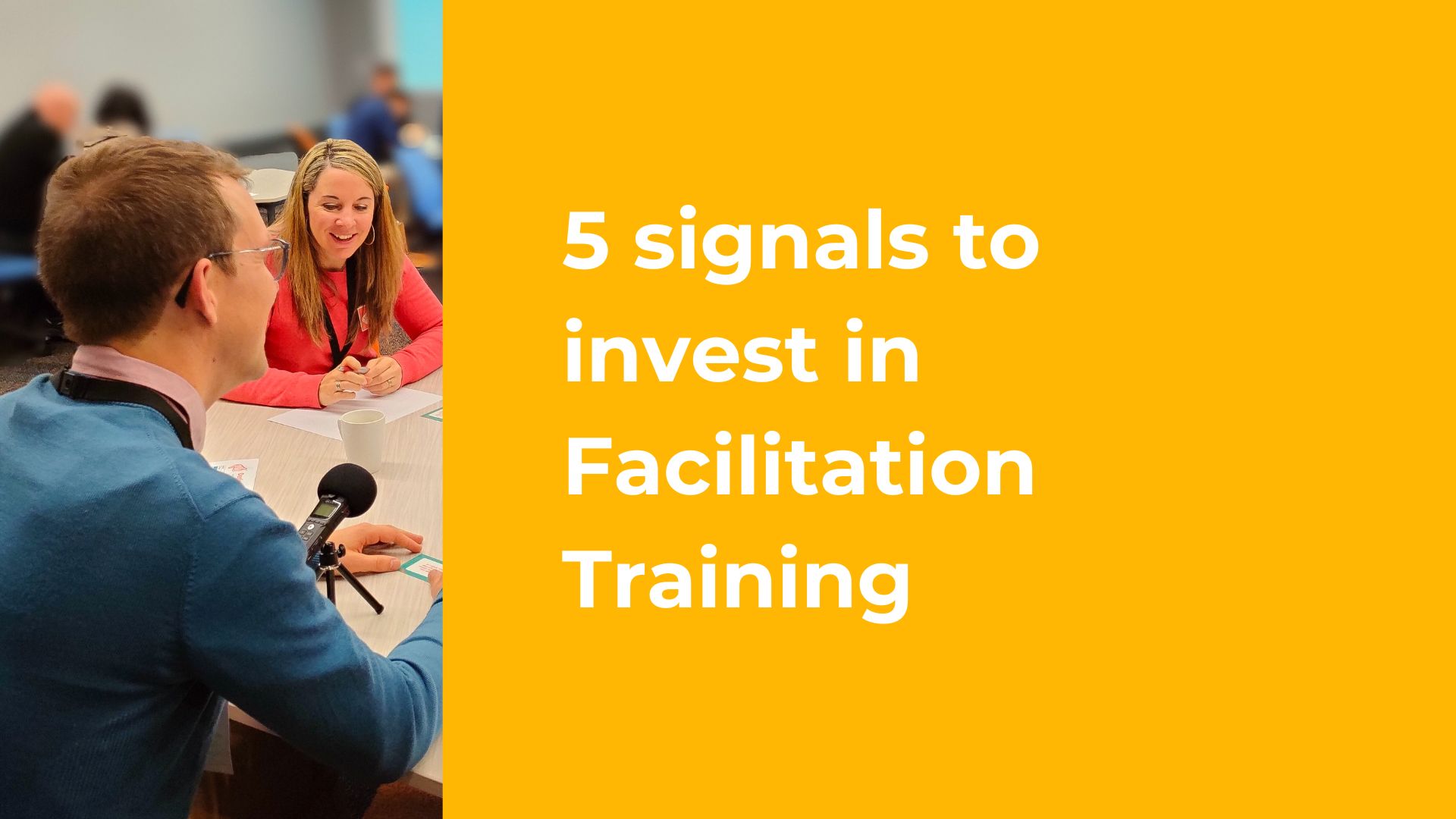5 signals to invest in facilitation training

✋One of the challenges of leadership is realising that not every decision will pay off.
On Friday, I spoke to our local Toastmaster's Club.
I challenged myself to speak off the cuff with zero preparation. (Perhaps not a smart move at a speaking club, you might think, but I'm trying to push my speaking skills.)
But I was rewarded with some "commendations and recommendations". That's the Toastmaster's format for providing feedback. People loved my personal stories and candid response to questions.
I also learned about my tendency to start sentences with "and".
"And... And... And..."
Really, there's nothing like practicing a skill live in front of real humans to grow and develop yourself.
When to invest in facilitation training
Over coffee afterwards, we talked about the challenges of investing in your people when the economy is tight.
"We desperately need to improve our meetings," one person shared with me, "but my bosses don't know any better."
Below I suggest 5 things to look out for. If several of these signals are present in your world, then investing in facilitation training is likely to save you money - regardless of the upfront cost.
1. Low engagement scores
Engagement scores are like rear view mirrors. They reflect the past so you can respond in the present.
Many organisations have shocking engagement scores. According to Gallup, 60% of us in Australasia aren't engaged in our jobs. We're turning up physically but we're mentally and spiritually checked out. Even worse, 14% of us are actively disengaged - looking for any way to escape.
If your engagement scores are low, it means people don't feel heard and valued.
Facilitation is the toolkit that allows you to engage your people. Without good facilitation, you'll never have the conversations you need to make progress on people's frustrations and fears.
2. Meetings are dominated by loud people
I remember attending dozens of meetings each week in my first corporate role.
I often found my mind wandering as somebody droned on about something irrelevant. People would regularly cut each other off. Meetings were often derailed by random ideas. And we often we overtime.
Sadly, that's normal. In a survey of 3164 workers by Salary.com, 71% of managers assessed their meetings as unproductive.
Facilitation is a big part of the answer to this challenge, along with some deeper organizational culture work. In my Master Your Meetings programme, I teach people how to run meetings with less time to prepare, and less time spent mopping up the mess afterwards.
3. People are fatigued by change
There's a myth that goes "People are scared of change". But it's not true.
In his book Hardwired Humans, Andrew O'Keefe taught me that we're not scared of change; we're scared of losing that which we value. This is an important distinction.
But what do your people value?
We don't often explore this. We're often so busy responding to crises and problems, or trying to convince people of our ideas.
Facilitation allows us to talk more openly about the things we care about - making it more likely we can retain what's working, even as the world changes around us.
4. Complaints around the photocopier
As a junior advisor at the Ministry of Justice, I spent hours around the photocopier working on Official Information Act requests. It wasn't a dream job for my busy brain. 😅
What kept me sane were the small conversations as people wandered in and out of the room. A colleague breaking down in tears about his family being held at gunpoint in South Africa. A senior advisor being passed over for promotion, again. A manager dreading her next meeting. A comms advisor cursing our IT system. A teammate cursing about an approval process. And so on.
Complaints are like pools of water. If the water never moves, it goes stagnant and green. We need to keep the water flowing to keep it healthy and clear.
The sooner we get our gripes out in the open, the better.
But they often remain as whispers in the photocopier room; they fester. Many leaders don't think it's a good idea to bring them out into the open.
But facilitation helps you to create an environment for that to happen in a constructive, not destructive, way.
5. Putting out fires
Reacting to crises is exhausting. Just ask any emergency worker.
But we don't need to have an emergency response job to be permanently in crisis management mode.
This is often the biggest shift when I'm coaching leaders one-on-one. Their calendars are dominated by other people's priorities. Other people's emails are their to-do lists. And their weekends bear the brunt of this.
(Sadly, many of these incredibly urgent things are not urgent. I call this false urgency.)
It's hard to progress our priorities if we speed from meeting to meeting and crisis to crisis.
"First things first" implores strategy expert Alicia McKay. But what is your top priority? Does your team know? And how do you stay in touch with that during a busy week?
Again, facilitation can help by ensuring our priorities are clear and ever present in the hustle and bustle of your work week.
How many of those resonated?
If you found yourself nodding as you read, let's chat. I'd love to make facilitation a superpower for you and your team.